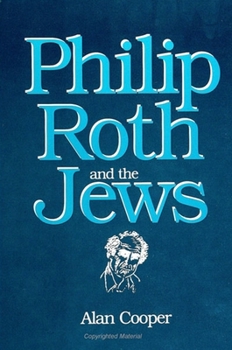Philip Roth and the Jews
Select Format
Select Condition 
Book Overview
Alan Cooper is Professor of English at York College, City University of New York. He chaired the English Department for 20 years and now serves as the college's faculty leader.
Format:Paperback
Language:English
ISBN:0791429105
ISBN13:9780791429105
Release Date:April 1996
Publisher:State University of New York Press
Length:319 Pages
Weight:1.23 lbs.
Dimensions:0.7" x 5.9" x 8.9"
Customer Reviews
1 rating
Phil Roth and his relationship with the Jews
Published by Thriftbooks.com User , 17 years ago
I have to say that I was skeptical of this book. I was doing research on Phil Roth for my students. I found the book to be an interesting tool in understanding and clarifying Roth as an author. He was born at Newark's Beth Israel Medical Center and raised in the Jewish enclave of Newark also known as Weequahic section. Every culture or ethnic group had their sections in Newark just like they did in New York City. His relationship with Judaism is not an easy one. He is not a religious Jew nor a practicing one. I don't know if he believes in God at all and I don't expect them too. We, writers and authors are quite a strange bunch. Anyway, Roth's Jewishness is examined but it's not quite clear to the reader. I believe that Roth like others thought that his neighborhood would have stayed the same since he left but it didn't. The Jewish community has become quite assimilated into American culture. Driving past the Weequahic section last week on a snowy day only by accident, I saw his Newark as once a section where it was a community. That's the problem, we have all lost our sense of community by moving away for a little more property and nicer homes and better schools. We now have longer commutes and expenses but we miss our families and friend and the familiarity of our neighborhoods. Maybe that's why some towns have generations of families like mine in the same community, at least, we know of each other. Anyway, Roth's relationship with his religion, culture, and ethnicity is often the subject of his many novels especially about the conflict regarding assimilating or becoming mainstream once they were seen as outsiders before. Remember in their time, it seemed that there were only two religious groups, Christians and Jews. Now you have Muslims, Hindus, Buddhists, Atheists, etc. among our mix. Life certainly has changed for the Jews who were once seen as unwelcome outsiders but tolerable. Now they are a part of American culture, they are no longer outsiders and are welcome into our families, communities, and society.






